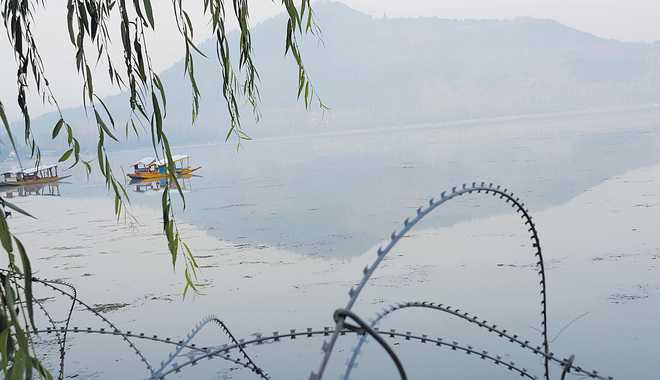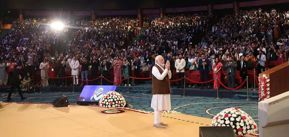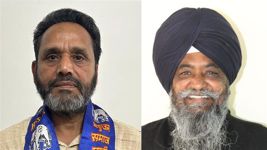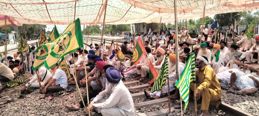
Photo by Harish Khare
Harish Khare
Right now there is this struggle over the state of “militancy.” There is a “100 Days of Curfew” narrative, insisting on themes and arguments of unabated anger “against India”. This narrative is competing with the “normalcy-is-returning” story. “There were today 600 people, with problems and grievances, waiting to visit offices in the secretariat; it takes them about three hours in the line, and yet they wait because they can’t wait for Syed Geelani's Calendar,” pointed out a political leader.
There is no doubt that the streets are not as worked up as they were probably a month ago. The shopkeepers, for instance, are defying the “Geelani Calendar.” Some parts of downtown Srinagar even have a kind of traffic jam.
But what everyone agrees is that what the state had witnessed in the post-Burhan Wani death days is a “new phase.” The Kashmiris have a long memory, and comparisons are made to “2008” and “2010.” There is also an agreement that what is new is that the rural areas have got heated up. The militancy is no longer an urban phenomenon. Even if a kind of fatigue were to set in the urban centres, things would remain on the boil in the rural areas.
The reason is also not too complicated, as everyone acknowledges the phenomenon of creeping “radicalisation.” There are over 800 mosques in the Kashmir Valley, mostly small and rural; and each imam finds it profitable to use his pulpit to add and sustain the mood of recrimination and anger against New Delhi. The mosques are also increasingly being used as resource centres for militant cadres.
Everyone agrees that this is a new phase of militancy. The “boys” are on their own, amenable to advice or control from none, and certainly not from that grand old man of “resistance”, the unflinchingly defiant Syed Ali Shah Geelani. He is seen as the biggest loser in the game. He palpably does not command, leave alone control, the streets.
There is no getting away from the troublesome fact that the younger generation of the Kashmiris has only known the language of gun, violence, coercion and intimidation. And, then, these young Kashmiris find themselves embroiled — thanks to the Internet and other tools of social media — in battles and recriminations abroad. They see their “struggle” as part of an unjust global order.
****
The Prime Minister, Narendra Modi, and the Union Home Minister, Rajnath Singh, have impressed the Kashmiri politicians. Rajnath Singh has come across as a good listener, whereas the Prime Minister is seen as a decisive leader, enjoying the advantage of a democratic mandate and as someone who can “sell” a solution to the Kashmiris as also to the rest of India. One senior Kashmiri leader even goes to the extent of asserting that “compared to Modi and Rajnath Singh, the UPA people — P Chidambaram and MK Narayanan— were disagreeable and often communal.”
Those in Srinagar who have interacted with the Prime Minister get a sense that he has some idea as how to proceed on the Kashmir matter and that over the last two years he has acquired a better insight into the Kashmir problem.
Yet, for now, there is a regret that the Prime Minister has so far not seized the opportunity that Kashmir presents him: to earn the mantle of a statesman. “Address the problem of the Kashmir Muslims, and you are immediately recognised as a world statesman,” argues a senior political leader.
There is, of course, the nagging doubt whether a political leader can remain steadfast in the chosen course, or whether he would allow himself to be distracted by compulsions of state-level electoral battles. A former Chief Minister, Dr Farooq Abdullah, with his trademark pointedness, notes: “Peace in the Valley cannot be held ransom to the UP and Punjab polls.”
****
In the ruling party in Srinagar there is a sense of disappointment that the ruling party at the Centre does not understand, leave alone appreciate, the historic significance of the PDP-BJP alliance. All the previous agreements and accords were understandings between Delhi and Srinagar, and between individuals; whereas, the argument goes, the PDP-BJP alliance is a Srinagar-Jammu-Delhi agreement, and is rooted in the legitimacy of electoral politics.
The Chief Minister, Ms Mehbooba Mufti, has surprised both her critics and admirers by her toughness, though there is a feeling that she was slow in discerning the potential for trouble in the post-Burhan Wani period and probably did not let the security forces go all out after the mischief-makers. Since then, she has stayed the course. And courageously so. She has not allowed herself to be intimidated by the moral righteousness that the stone-throwers and their patrons seek to appropriate for their tactics. Instead, she has joined the argument as to what is good and what is injurious to the Kashmiri society.
****
Kashmir and its meezaz (cultural and political) do not remain unaffected by what happens in the rest of India. It was pointed out that whereas the Kashmiris had remained mostly unmoved by the 2002 Gujarat riots, they were deeply disturbed by the killing of Akhlaq. Reports of a rising tide of intolerance since May 2014 only added to democratic India’s “trust deficit.”
Whatever political and electoral dividends were extracted from all the ugly debates and confrontation over patriotism and nationalism, the new grammar of jingoism has complicated the task of reconciliation in Kashmir. “Earlier, we used to have civil society people — academicians, lawyers, journalists, intellectuals — visit Kashmir and engage with various leaders and groups; today, we feel abandoned,” was a perceptive observation. What was left unsaid was that the Indian “mainstream” discourse today has become so edgy and so brittle that no one from the civil society can run the risk of being seen as engaging with separatists and dissidents.
****
Yet Pakistan is the elephant — even if unseen and unacknowledged — in the room. There is no option but to talk to Pakistan. Pakistan has the political, religious, and ideological assets in the Kashmir Valley and has an unapologetic will and insatiable appetite to intervene and determine Kashmir’s political weather.
That simply means that the Prime Minister and his national security team will, sooner or later, have to work on a new template of statecraft, producing a harmony of goals and principles, both in Srinagar and New Delhi. The current unrest can be an opportunity. There can be no disagreement that the PDP-BJP alliance has produced a new chemistry. The equation is not settled yet, but it is seen as having the potential to do things differently from that done these past 70 years. Yet the question remains — as much for the Kashmiri as for any other Indian “does anyone in New Delhi know what to do with Kashmir?”



























